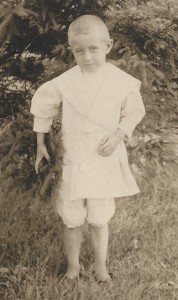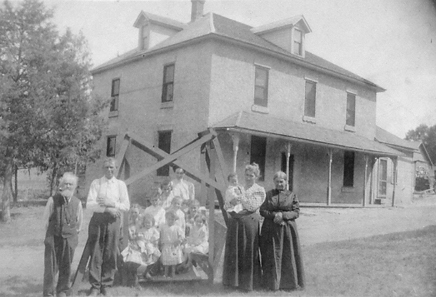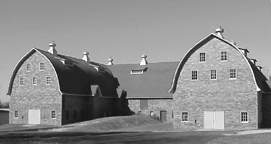Catholics, Cows, and a Clunker

Carl Clemens
When the wheels needed to be changed or the axles greased, Dad—not yet a man—lifted the more than 200-pound hay wagon with his back, raised it higher with his arms and held it steady while his older brother Aloysius, or Louie as the family called him, slipped the new wheel on the axle. That’s how strong my father was.
Born into a Minnesota farming family in 1905, Carl, my father, was the middle child of thirteen, all born between 1898 and 1914. A set of twins died at three days, a sister at four months. All were born in the same two-story stone house on the family farm. Four generations of Clemens grew up in those stone walls, surrounded by cows, company, and Catholicism. You weren’t considered a good Catholic unless you had a child at least every other year.

Clemens family farm, three generations, fall of 1912
Working in the fields one burning afternoon alongside his mother, he observed her intently. Stooped and worn, gray strands of hair straggled from her bun, dampened by sweat escaping her forehead, he saw how tired and weathered she looked. Her back bent shocking wheat, she took the sheaves of grain, tied them, then carefully stood the bundles upright in the field for drying. He decided right then and there that wasn’t going to happen to him, knowing if he stayed he’d sink into her footprints forever, tied to endless seasons of planting corn, milking cows, and disking hay.
When he was fifteen, Carl pooled his money with three friends, Paul Adamson, Johnny Mohlke, and Tone Conway (Michael Anthony Conway was his given name; later in life he became One-Eyed Mike). They bought an early 1920s touring car, an open-topped green Chevrolet with isinglass curtains. It was clunker that cost them $10 apiece; it was all they could afford. When they first got it, Johnny, a fiery redhead who didn’t weigh more than 150 pounds and never sat still for more than ten seconds, was the only one who could drive, and he drove like a maniac. He was the drinker of the group, sometimes pouring it down for a week. Tone and Paul drank heavily too, but not like Johnny. Carl, the oldest of the four, was the only one who didn’t partake; alcohol made him sick as a poisoned pup.
They often rolled the car on the country dirt and gravel roads, got out, and tipped it up on its wheels to take off again. It didn’t go over 60 miles per hour, but Johnny put the pedal to the metal, in town or out. Carl soon took over the driving. He was reputed to be a hot-rodder, accelerating with the cutout wide open. He drove fast, but he drove sober. Every time Ma heard their phone ring, one short and one long, she would shake, sure her son was in another accident and someone was hurt, or worse, dead. Nobody ever was—not seriously anyway—although Carl did come home once with his arm torn open. A scar ran the whole length of his forearm. It wasn’t something he bragged about.

St. Mary’s Farmstead (recent photo)
Ma was of the opinion boys should stay home and work on the family farm. Carl was of a different opinion. Trying to please his mother was about as easy as jumping over his own knees, and one morning he disappeared and didn’t come back. Ma was hurt; she worried about him constantly and prayed he’d call or write. No matter to Carl; he was tired of being told what to do. He didn’t go far, just off to his uncle Frank Nigon’s place east of Rochester to work, then in 1923, he and Tone got a job at St. Mary’s Hospital Dairy Farmstead, milking cows to supply pasteurized milk to St. Mary’s Hospital.
When he was eighteen, he and Tone decided to head west for work and adventure. They called up Johnny and Paul, and the four friends each packed a suitcase. They hopped into their Chevy and drank their way to Seattle while Carl drove. They dropped Carl off, turned around, and drove back. They knew they were farmers, and that their ties were in Minnesota. Carl remained in Seattle, first getting a job in the lumber mills, and then for a dairy delivering milk. He ended up in California where there was better work and better weather. He gained employment with Frederickson & Watson Construction Company, traveling from job to job; in those days, to find work, unless you were a farmer, you had to go were the jobs were. My father, the only man in the family to leave the farming life, was considered the smart one.
Writings~Rambles~Rhymes
- Catherine Sevenau's profile
- 6 followers



